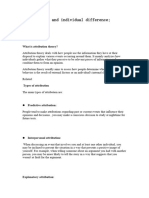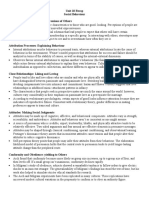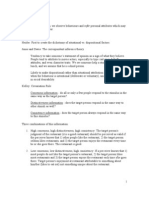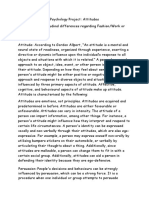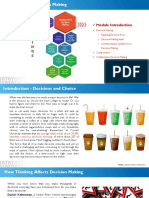0 ratings0% found this document useful (0 votes)
Attributional Biases Gilos
Attributional Biases Gilos
Uploaded by
Jike AlabadoThis document discusses various types of attribution biases in psychology. Attribution bias refers to systematic errors people make when evaluating their own and others' behaviors. The types discussed include the fundamental attribution error, actor-observer bias, self-serving bias, blaming the victim, hostile attribution bias, and group-serving bias. Each bias leads people to attribute behaviors differently based on internal versus external factors or whether behaviors are their own or someone else's.
Copyright:
© All Rights Reserved
Available Formats
Download as PPTX, PDF, TXT or read online from Scribd
Download as pptx, pdf, or txt
Attributional Biases Gilos
Attributional Biases Gilos
Uploaded by
Jike Alabado0 ratings0% found this document useful (0 votes)
This document discusses various types of attribution biases in psychology. Attribution bias refers to systematic errors people make when evaluating their own and others' behaviors. The types discussed include the fundamental attribution error, actor-observer bias, self-serving bias, blaming the victim, hostile attribution bias, and group-serving bias. Each bias leads people to attribute behaviors differently based on internal versus external factors or whether behaviors are their own or someone else's.
Original Title
7.-Attributional-Biases-Gilos.pptx
Copyright
© © All Rights Reserved
Available Formats
PPTX, PDF, TXT or read online from Scribd
Share this document
Did you find this document useful?
Is this content inappropriate?
This document discusses various types of attribution biases in psychology. Attribution bias refers to systematic errors people make when evaluating their own and others' behaviors. The types discussed include the fundamental attribution error, actor-observer bias, self-serving bias, blaming the victim, hostile attribution bias, and group-serving bias. Each bias leads people to attribute behaviors differently based on internal versus external factors or whether behaviors are their own or someone else's.
Copyright:
© All Rights Reserved
Available Formats
Download as PPTX, PDF, TXT or read online from Scribd
Download as pptx, pdf, or txt
0 ratings0% found this document useful (0 votes)
Attributional Biases Gilos
Attributional Biases Gilos
Uploaded by
Jike AlabadoThis document discusses various types of attribution biases in psychology. Attribution bias refers to systematic errors people make when evaluating their own and others' behaviors. The types discussed include the fundamental attribution error, actor-observer bias, self-serving bias, blaming the victim, hostile attribution bias, and group-serving bias. Each bias leads people to attribute behaviors differently based on internal versus external factors or whether behaviors are their own or someone else's.
Copyright:
© All Rights Reserved
Available Formats
Download as PPTX, PDF, TXT or read online from Scribd
Download as pptx, pdf, or txt
You are on page 1/ 8
By: Samuel Gilos Jr.
-Is a lack of objectivity or an inclination to favor one
thing or person over another.
- In psychology, attribution bias is a cognitive bias
that refers to the systematic errors made when people
evaluate or try to find reasons for their own and
others' behaviors.
The fundamental attribution error
The actor-observer bias
The self-serving bias
Blaming the victim
The hostile attribution bias
Group-Serving Bias
The fundamental attribution error - (also known as
correspondence bias or over attribution effect) is the
tendency for people to over-emphasise dispositional, or
personality-based explanations for behaviours observed
in others while under-emphasising situational
explanations.
The actor-observer bias - is a term in social
psychology that refers to a tendency to attribute one's
own actions to external causes while attributing other
people's behaviors to internal causes. It is a type of
attributional bias that plays a role in how we perceive
and interact with other people.
The self-serving bias - is people's tendency to
attribute positive events to their own character but
attribute negative events to external factors.
Blaming the victim - A victim is a person who is
harmed by the actions of another person or as the result
of circumstance. When people blame the victim, they
attribute the cause of the victim’s suffering to the
behaviors or characteristics of the victim, instead of
attributing the cause to a perpetrator or situational
factors.
The hostile attribution bias - (HAB) is the tendency to
interpret the behavior of others, across situations, as
threatening, aggressive, or both. People who exhibit the HAB
think that ambiguous behavior of others is hostile and often
directed toward them, while those who do not exhibit the
HAB interpret the behavior in a nonhostile, nonthreatening
way.
Group-Serving Bias - is the human tendency to
consistently attribute a group's successes to its own
efforts, and to attribute failures to outside
interference.
THANK YOU
Anderson, K. B., Anderson, C. A., Dill, K. E., & Deuser, W. E. (1988).
The interactive relations between trait hostility, pain and aggressive
thoughts. Aggressive Behavior, 24, 161-171.
Boyes, A. (2013). The Self-Serving Bias - Definition, Research, and
Antidotes. Retrieve from
https://www.psychologytoday.com/us/blog/in-practice/201301/the-
self-serving-bias-definition-research-and-antidotes
Cherry, K. (2019). Actor-Observer Bias in Social Psychology. Retrieve
from https://www.verywellmind.com/what-is-the actor-observer-
bias-2794813
Heider, F. (1958). The psychology of interpersonal relations. New
York: Wiley. p. 322.
McLeod, S. (2018). Fundamental Attribution Error. Retrieve from
https://www.simplypsychology.org/fundamental-attribution.html
You might also like
- Instant ebooks textbook Social Psychology and Human Nature 1st Edition Roy F. Baumeister download all chapters100% (4)Instant ebooks textbook Social Psychology and Human Nature 1st Edition Roy F. Baumeister download all chapters40 pages
- Use of Technology and Cognitive Approaches in Law Enforcement - Edited (1) .EditedNo ratings yetUse of Technology and Cognitive Approaches in Law Enforcement - Edited (1) .Edited7 pages
- Social Psychology: Changing Attitudes Through PersuationNo ratings yetSocial Psychology: Changing Attitudes Through Persuation7 pages
- By Dipanjana Chatterjee Asst. Professor AUKNo ratings yetBy Dipanjana Chatterjee Asst. Professor AUK38 pages
- Role of Attribution and Attitudes in Cognizing Others100% (1)Role of Attribution and Attitudes in Cognizing Others3 pages
- Attribution (Psychology) : Theories and ModelsNo ratings yetAttribution (Psychology) : Theories and Models8 pages
- Definition, Relationship Between Prejudice, Stereotype and DiscriminationNo ratings yetDefinition, Relationship Between Prejudice, Stereotype and Discrimination6 pages
- Family Type and Gender: Predictor of Risk Factor Externalizing Behavior in Elementary School Students100% (1)Family Type and Gender: Predictor of Risk Factor Externalizing Behavior in Elementary School Students17 pages
- Unit 10 Recap Social Behaviour Person Perception: Forming Impressions of OthersNo ratings yetUnit 10 Recap Social Behaviour Person Perception: Forming Impressions of Others2 pages
- Social Relations: (Prejudice, Aggression) Submitted To, Ma'am Hina ZahraNo ratings yetSocial Relations: (Prejudice, Aggression) Submitted To, Ma'am Hina Zahra9 pages
- 3 Anger Expression and Mental Health of Bully Perpetrators 04-06-14No ratings yet3 Anger Expression and Mental Health of Bully Perpetrators 04-06-147 pages
- To Assess The Source of Another BehaviourNo ratings yetTo Assess The Source of Another Behaviour8 pages
- Lecture 3: Personality Disorder and SchizophreniaNo ratings yetLecture 3: Personality Disorder and Schizophrenia10 pages
- A Proposed Treatment Connection for Borderline Personality Disorder (BPD): Dialectical Behavior Therapy (DBT) and Traumatic Incident Reduction (TIR)From EverandA Proposed Treatment Connection for Borderline Personality Disorder (BPD): Dialectical Behavior Therapy (DBT) and Traumatic Incident Reduction (TIR)5/5 (2)
- Full Download Learn Psychology Kenneth E Carter PDF100% (6)Full Download Learn Psychology Kenneth E Carter PDF53 pages
- Principles of Management: Module 5: Decision MakingNo ratings yetPrinciples of Management: Module 5: Decision Making35 pages
- Acaps Technical Brief Cognitive Biases March 2016 PDFNo ratings yetAcaps Technical Brief Cognitive Biases March 2016 PDF22 pages
- Frijda Nico H., Antony S. R. Manstead, Sacha Bem Emotions and Beliefs How Feelings Influence Thoughts Studies in Emotion and Social Interaction 2000100% (1)Frijda Nico H., Antony S. R. Manstead, Sacha Bem Emotions and Beliefs How Feelings Influence Thoughts Studies in Emotion and Social Interaction 2000257 pages
- Frontiers - Human Vs Artificial InteligenceNo ratings yetFrontiers - Human Vs Artificial Inteligence13 pages
- Module Introduction: Collaborative Decision MakingNo ratings yetModule Introduction: Collaborative Decision Making66 pages
- Download Full Rational Suicide in the Elderly Clinical Ethical and Sociocultural Aspects 1st Edition Robert E. Mccue PDF All Chapters100% (2)Download Full Rational Suicide in the Elderly Clinical Ethical and Sociocultural Aspects 1st Edition Robert E. Mccue PDF All Chapters55 pages
- Socio - Cognitive Biases Are Associated To Belief in Neuromyth and Cognitive EnhancementNo ratings yetSocio - Cognitive Biases Are Associated To Belief in Neuromyth and Cognitive Enhancement5 pages
- 10 Life-Changing Books Every Developer Should ReadNo ratings yet10 Life-Changing Books Every Developer Should Read13 pages
- Forensic Psychology Literature Review Topics100% (3)Forensic Psychology Literature Review Topics6 pages
- Intelligence Failure Theory - Oxford Research Encyclopedia of International StudiesNo ratings yetIntelligence Failure Theory - Oxford Research Encyclopedia of International Studies23 pages
- 21 Behavioral Bias of Equity Investors - MUHAMMAD AfzalNo ratings yet21 Behavioral Bias of Equity Investors - MUHAMMAD Afzal12 pages
- Class Notes The Psychology of Decision-Making - Understanding Human ChoicesNo ratings yetClass Notes The Psychology of Decision-Making - Understanding Human Choices3 pages
- Instant ebooks textbook Social Psychology and Human Nature 1st Edition Roy F. Baumeister download all chaptersInstant ebooks textbook Social Psychology and Human Nature 1st Edition Roy F. Baumeister download all chapters
- Use of Technology and Cognitive Approaches in Law Enforcement - Edited (1) .EditedUse of Technology and Cognitive Approaches in Law Enforcement - Edited (1) .Edited
- Social Psychology: Changing Attitudes Through PersuationSocial Psychology: Changing Attitudes Through Persuation
- Role of Attribution and Attitudes in Cognizing OthersRole of Attribution and Attitudes in Cognizing Others
- Definition, Relationship Between Prejudice, Stereotype and DiscriminationDefinition, Relationship Between Prejudice, Stereotype and Discrimination
- Family Type and Gender: Predictor of Risk Factor Externalizing Behavior in Elementary School StudentsFamily Type and Gender: Predictor of Risk Factor Externalizing Behavior in Elementary School Students
- Unit 10 Recap Social Behaviour Person Perception: Forming Impressions of OthersUnit 10 Recap Social Behaviour Person Perception: Forming Impressions of Others
- Social Relations: (Prejudice, Aggression) Submitted To, Ma'am Hina ZahraSocial Relations: (Prejudice, Aggression) Submitted To, Ma'am Hina Zahra
- 3 Anger Expression and Mental Health of Bully Perpetrators 04-06-143 Anger Expression and Mental Health of Bully Perpetrators 04-06-14
- A Proposed Treatment Connection for Borderline Personality Disorder (BPD): Dialectical Behavior Therapy (DBT) and Traumatic Incident Reduction (TIR)From EverandA Proposed Treatment Connection for Borderline Personality Disorder (BPD): Dialectical Behavior Therapy (DBT) and Traumatic Incident Reduction (TIR)
- Full Download Learn Psychology Kenneth E Carter PDFFull Download Learn Psychology Kenneth E Carter PDF
- Principles of Management: Module 5: Decision MakingPrinciples of Management: Module 5: Decision Making
- Acaps Technical Brief Cognitive Biases March 2016 PDFAcaps Technical Brief Cognitive Biases March 2016 PDF
- Frijda Nico H., Antony S. R. Manstead, Sacha Bem Emotions and Beliefs How Feelings Influence Thoughts Studies in Emotion and Social Interaction 2000Frijda Nico H., Antony S. R. Manstead, Sacha Bem Emotions and Beliefs How Feelings Influence Thoughts Studies in Emotion and Social Interaction 2000
- Module Introduction: Collaborative Decision MakingModule Introduction: Collaborative Decision Making
- Download Full Rational Suicide in the Elderly Clinical Ethical and Sociocultural Aspects 1st Edition Robert E. Mccue PDF All ChaptersDownload Full Rational Suicide in the Elderly Clinical Ethical and Sociocultural Aspects 1st Edition Robert E. Mccue PDF All Chapters
- Socio - Cognitive Biases Are Associated To Belief in Neuromyth and Cognitive EnhancementSocio - Cognitive Biases Are Associated To Belief in Neuromyth and Cognitive Enhancement
- 10 Life-Changing Books Every Developer Should Read10 Life-Changing Books Every Developer Should Read
- Intelligence Failure Theory - Oxford Research Encyclopedia of International StudiesIntelligence Failure Theory - Oxford Research Encyclopedia of International Studies
- 21 Behavioral Bias of Equity Investors - MUHAMMAD Afzal21 Behavioral Bias of Equity Investors - MUHAMMAD Afzal
- Class Notes The Psychology of Decision-Making - Understanding Human ChoicesClass Notes The Psychology of Decision-Making - Understanding Human Choices


















